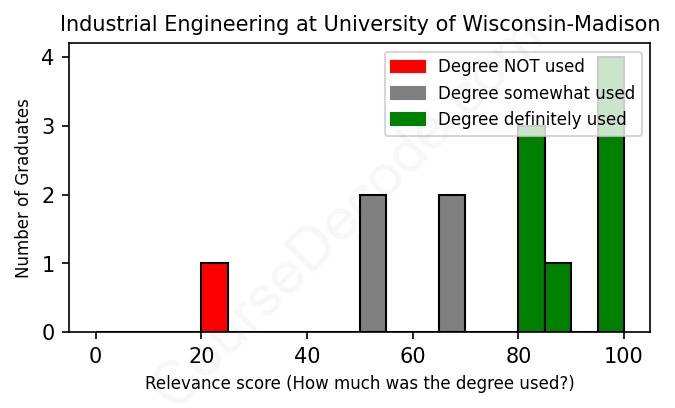
First, some facts. Of the Industrial Engineering graduates from University of Wisconsin-Madison we've analyzed , here's how many have used (or NOT used) their degree in their career:

These are estimates based on AI analysis of 13 LinkedIn profiles (see below).
The verdict? Above average. Overall, with an average relevance score of 76%, Industrial Engineering graduates from University of Wisconsin-Madison have a higher likelihood (+9%) of finding work in this field compared to the average graduate across all fields:
And for comparison, here's the chart for all profiles we've looked at across all degrees.
Also, after graduating, only 15% of these graduates have pursued further education other than another Bachelor's degree (such as a Masters degree or other), compared to the average across all profiles of 35%. This suggests a Bachelors degree is enough for most Industrial Engineering graduates, and it's normal to look for work straight after graduation.
See the details:
|
Relevance score: 50% We think this person has gone into a career only somewhat relevant to their degree. We think this person has gone into a career only somewhat relevant to their degree.
DEGREE INFOGraduated in 2023 from University of Wisconsin-Madison with a Bachelor of Science - BS in Industrial Engineering. No other secondary education since. JOB HISTORY SINCE GRADUATIONAnalyst, Insurance-Linked Securities Gallagher Re Jul 2023 - Present ABOUTNo information provided. |
The top 10 most common jobs done by the graduates we've analyzed (ranked most common to least) are:
People who graduated with a degree in Industrial Engineering from the University of Wisconsin-Madison have landed in a variety of roles, ranging from software consulting to supply chain management. However, the relevance of these jobs to their degree varies quite a bit. Many graduates have taken on positions that utilize some analytical, organizational, or process improvement skills, like being consultants or managers in different industries. But it’s evident that while some roles, like those in logistics and manufacturing engineering, directly align with industrial engineering principles, others, such as software consultancy or general project management, touch on skills learned during their degree only lightly.
Overall, the data shows that graduates' careers tend to split into two main categories: those that are clearly tied to industrial engineering principles and those that are more generalized in nature. Roles that are deeply relevant include positions as industrial engineers, operations managers, and lean manufacturing engineers, where their technical skills are put to use in optimization and efficiency improvement. On the flip side, we see graduates in roles like business unit leaders or analysts that may involve analytical skills but don’t dive directly into the heavy engineering concepts most graduates would have learned. So, while there’s a blend of engineering and non-engineering roles, a significant number of these graduates maintain a connection to their industrial engineering roots in their careers.
Here is a visual representation of the most common words in job titles for Industrial Engineering graduates (this is across all Industrial Engineering graduates we've analyzed, not just those who went to University of Wisconsin-Madison):

Graduates from the University of Wisconsin-Madison who studied Industrial Engineering seem to have carved out some pretty solid career paths. For many of them, their first jobs right out of college lean toward roles in consulting, manufacturing, and engineering positions. It's quite common to see them starting as analysts, engineers, or managers, often in reputable companies across various industries like logistics, healthcare, and technology. Whether it's consulting at Accenture or stepping into manufacturing roles at Eaton, it seems like a lot of these grads get into substantial roles fairly quickly after graduation.
Looking five to ten years down the line, many alumni appear to continue progressing within their fields, frequently moving into higher management roles or specialized positions. For instance, those who started in logistics often bump into operational management or engineering management positions at companies like XPO Logistics or IMI Precision Engineering. While not every graduate sticks strictly to Industrial Engineering roles—as seen with some venturing into data analysis or project management—the majority still find relevant work that utilizes their engineering background in some capacity. Overall, these graduates seem to be doing quite well in their careers, often aligning with their educational background and really making their mark in their respective industries.
Honestly, a Bachelor’s degree in Industrial Engineering can be pretty challenging, especially at a competitive school like the University of Wisconsin-Madison. The coursework typically includes a mix of math, physics, statistics, and engineering principles, which means you'll be doing a lot of problem-solving and working on projects that require some serious analytical skills. It’s not impossible, though, and if you stay organized and put in the effort, you can definitely handle it. Many students find it rewarding as it balances theory with practical applications, but just be prepared for some late nights studying and group work. Overall, it’s a solid mix of tough and rewarding!
Most commonly, in the LinkedIn profiles we've looked at, it takes people 4 years to finish a Bachelor degree in Industrial Engineering.
Looking at the job history of these Industrial Engineering grads from UW-Madison, it seems like most of them have landed solid positions and are likely making decent money, especially the ones who graduated in the earlier years. Those who started out in consulting or managerial roles at companies like Accenture and GE Healthcare probably kicked off their careers with good salaries. Even more recent grads, like those from 2023, are securing roles in reputable companies like Procter & Gamble and Slack, which usually pay well. However, there are a couple of outliers, such as those working in farm or tech support jobs, who might not be raking in the same dough. Overall, it looks like pursuing an industrial engineering degree from UW-Madison is a pretty good investment in terms of financial success!
Here is a visual representation of the most common words seen in the "about" section of LinkedIn profiles who have a Bachelor degree in Industrial Engineering (this is across all Industrial Engineering graduates we've analyzed, not just those who went to University of Wisconsin-Madison). This may or may not be useful:

Here are all colleges offering a Bachelor degree in Industrial Engineering (ordered by the average relevance score of their Industrial Engineering graduates, best to worst) where we have analyzed at least 10 of their graduates:
| College | Score | Count |
|---|---|---|
 Iowa State University Iowa State University
|
88 | 11 |
 North Carolina State University North Carolina State University
|
87 | 12 |
 California Polytechnic State University-San Luis Obispo California Polytechnic State University-San Luis Obispo
|
87 | 15 |
 Texas A&M University Texas A&M University
|
83 | 39 |
 Purdue University Purdue University
|
81 | 36 |
 University of Central Florida University of Central Florida
|
80 | 23 |
 Georgia Institute of Technology Georgia Institute of Technology
|
80 | 59 |
 Penn State University Penn State University
|
79 | 16 |
 Texas Tech University Texas Tech University
|
79 | 10 |
 University of Pittsburgh University of Pittsburgh
|
79 | 15 |
 University of Washington University of Washington
|
78 | 12 |
 University of Arkansas University of Arkansas
|
78 | 11 |
 University of Wisconsin-Madison University of Wisconsin-Madison
|
76 | 13 |
 University of Illinois at Urbana-Champaign University of Illinois at Urbana-Champaign
|
73 | 15 |
 West Virginia University West Virginia University
|
71 | 19 |
 Clemson University Clemson University
|
69 | 23 |
 University of Florida University of Florida
|
64 | 11 |